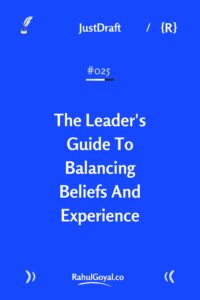When Should Leaders Trust Their Beliefs vs Experience
This week, let’s explore a question that every leader—whether seasoned or aspiring—should consider: Should you rely on your beliefs or trust your experience when making key decisions? Beliefs vs Experience is not just a philosophical puzzle. Your answer reveals the core of your leadership style.
The Leadership Paradox – Beliefs vs Experience
Some leaders hold firm to their vision, even when the world doubts them. Others adapt based on real-world feedback, shifting their approach as new data emerges. Neither is inherently right or wrong—the challenge is knowing when to stand firm and when to evolve.
The Tale of Two Leaders
Leader A had an unshakable belief in his product vision. Despite early skepticism, he resisted changes suggested by initial users. “They don’t see the future yet,” he reasoned. Two years later, the market caught up to his vision, and his product thrived.
Leader B started with a clear target market in mind. However, when customer feedback revealed unexpected needs, she pivoted her entire strategy. Today, her business is flourishing, though it serves a completely different audience than she initially planned.
Both succeeded, but their paths were opposite. So what’s the right approach?
The Beliefs vs Experience Balance
Here’s what I’ve learned and gather so far from leaders:
When to Stand by Your Beliefs
Strong convictions can fuel innovation and inspire teams, but they can also lead to blind spots. You should hold firm to your beliefs when:
- When you have deep domain expertise
- During early stages of innovation
- When short-term data might not tell the full story
- When your vision requires changing user behaviour
Think about Netflix’s switch to streaming. Everyone said they were crazy to move away from their successful DVD business. But their belief in streaming’s future proved right.
When to Let Experience Lead
Adapting based on experience can prevent costly mistakes, but too much flexibility can make a leader seem directionless. Experience should take priority when:
- When market feedback is consistent
- When user behaviour shows clear patterns
- When your beliefs come from outdated contexts
- When the cost of being wrong is high
Look at Microsoft. They believed Windows would rule forever. But under Satya Nadella, they let experience guide them to cloud computing. Now they’re stronger than ever.
The Balance That Changes Everything
The best leaders don’t just pick one side—they integrate both
The magic happens when you hold strong beliefs loosely.
Try this framework:
- Source Check Ask: “Where did this belief come from? Is it still relevant?”
- Cost Analysis What costs more – being wrong about your belief or ignoring your experience?
- Time Test Is this a short-term trend or a fundamental shift?
- Experiment: Use A/B testing, pilot programs, or advisory boards to validate decisions before going all in.
- Challenge Assumptions: Make a Red team to play devil’s advocate and poke holes in your thinking.
Making This Work in Real Life
Start with these questions:
- List your three strongest business beliefs
- Write down when you last tested each one
- Note any experiences you might be ignoring
The best leaders use what I call the 80/20 rule: 80% belief in core values, 20% flexibility for what experience teaches you.
The Truth About Leadership
Remember this: Belief without experience is just stubbornness. Experience without belief is simply randomness. You need both.
Next time you face a big decision (Beliefs vs Experience), try this: Write down your core belief about the situation. Then list three experiences that support it and three that challenge it. You might surprise yourself.
Think about the last big decision you made. Did you lead with belief or experience? How did it turn out?
Read last week’s JustDraft newsletter about The Japanese 5S Method.
Two Quotes
Your beliefs shape your future, but your experiences shape your beliefs. Choose wisely which leads.
Leadership excellence isn’t about choosing between belief and experience – it’s about knowing which one to trust in each moment.
One Passage From A Book
I learned that if you work hard and creatively, you can have just about anything you want, but not everything you want. Maturity is the ability to reject good alternatives in order to pursue even better ones. The more you think about your decisions, the better you’ll be at making them. Pain plus reflection equals progress.
📚From “Principles: Life and Work” by Ray Dalio

